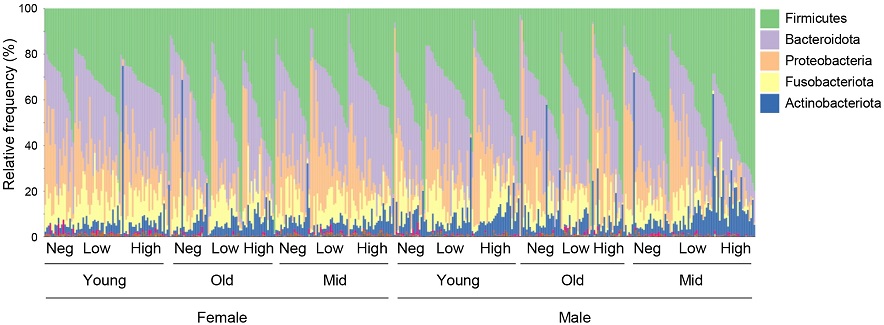Age, Gender And Viral Load Influence The Nasopharyngeal Microbiome In SARS-CoV-2 Infection
Nikhil Prasad Fact checked by:Thailand Medical News Team Mar 02, 2024 1 year, 9 months, 4 weeks, 2 days, 39 minutes ago
COVID-19 News: The COVID-19 pandemic caused by the SARS-CoV-2 virus has spurred a global scientific effort to understand its pathogenesis and develop effective therapeutic strategies. The respiratory tract, particularly the nasal cavity, plays a crucial role in the initial colonization and progression of the infection. Recent research covered in this
COVID-19 News report, conducted by the University of Perugia and the University of Florence in Italy delves into the intricate relationship between the nasopharyngeal microbiome and SARS-CoV-2 infection, shedding light on age- and gender-specific variations that could shape the future of personalized medicine in COVID-19 patients.
 Taxonomic composition of nasopharyngeal microbiome. Bar plot showing bacterial composition (abundance percentage) of each sample at the phylum level. Taxa are differentiated by colors. Samples are ranked based on the most abundant phylum (Firmicutes).
Understanding SARS-CoV-2 Pathogenesis
Taxonomic composition of nasopharyngeal microbiome. Bar plot showing bacterial composition (abundance percentage) of each sample at the phylum level. Taxa are differentiated by colors. Samples are ranked based on the most abundant phylum (Firmicutes).
Understanding SARS-CoV-2 Pathogenesis
SARS-CoV-2, the virus responsible for COVID-19, binds to the Angiotensin-Converting Enzyme 2 (ACE2) receptor and enters susceptible cells, initiating viral replication and release. The host-pathogen interaction is pivotal in determining the clinical outcomes, ranging from asymptomatic cases to severe, potentially fatal manifestations. Factors such as age, comorbidities, genetics, and the microbiota have been identified as contributors to the diverse clinical presentations of COVID-19.
The Emerging Role of Respiratory Microbiota
While the gut microbiota has been extensively studied for its role in local and systemic immunity, emerging evidence emphasizes the significance of the respiratory microbiota in defending against airborne pathogens. The nasal cavity, with its high expression of ACE2, becomes a critical battleground during the early phases of SARS-CoV-2 infection. The composition of the nasopharyngeal microbiome, comprised of commensal microbes, may play a pivotal role in modulating the immune response and influencing COVID-19 clinical outcomes.
Designing the Study
The research conducted a cross-sectional, monocentric study recruiting individuals undergoing SARS-CoV-2 molecular testing at the Hospital of Perugia in Italy. Residual material from nasopharyngeal swabs was collected for microbiome composition analysis and short-chain fatty acid (SCFA) measurements. The study aimed to investigate the influence of age, gender, and viral load on the nasopharyngeal microbiome and its potential implications in SARS-CoV-2 infection.
Results: Age, Gender, and Viral Load Influence Nasopharyngeal Microbiome Composition
Analysis of the nasopharyngeal microbiome revealed the dominance of Firmicutes, Bacteroidota, Proteobacteria, Actinobacteriota, Prevotella, Streptococcus, and Veillonella. Stratification based on age, gender, and viral load demonstrated significant effects on microbiome composition. Age-related variations were observed, with a decrease in microbial richness i
n older individuals, especially females, and a parallel decrease in evenness. Viral load and gender also influenced microbiome composition, with the high viral load affecting both males and females.
The Role of Lachnospirales-Lachnospiraceae in Females
A crucial finding emerged when focusing on females infected with SARS-CoV-2, irrespective of age or viral load. The study identified a shared expansion of Lachnospirales-Lachnospiraceae in SARS-CoV-2-positive females. This specific microbial signature was consistent across age groups, suggesting a potential causative role in the infection process.
Short-Chain Fatty Acids: A Functional Microbial Profile
Further investigation into the metabolites produced by Lachnospirales-Lachnospiraceae revealed a reduction in the branched SCFA isobutanoic acid, as well as longer-chain SCFAs (valeric and hexanoic acids) in SARS-CoV-2-positive females. This functional microbial profile indicated a distinctive association between the expansion of Lachnospirales-Lachnospiraceae and changes in short-chain fatty acid levels in infected females.
Discussion: Unraveling the Complex Interplay
The dynamic nature of the nasopharyngeal microbiome, influenced by age, gender, and viral load, underscores the need for a nuanced approach in understanding SARS-CoV-2 infection. Age-related changes in microbiome composition align with previous findings in the gut microbiota, suggesting a broader impact on various body sites. Gender-specific variations, particularly in females, point towards the influence of sex hormones on microbial communities in the context of SARS-CoV-2 infection.
The Expansion of Lachnospirales-Lachnospiraceae in SARS-CoV-2-positive females introduces a fascinating yet complex aspect to the microbiome's role in infection. Previous studies have shown conflicting results regarding the role of Lachnospiraceae in different clinical settings, emphasizing the need for further characterization in specific contexts.
Conclusion: Towards Personalized Medicine in COVID-19
In conclusion, this study provides valuable insights into the intricate relationship between the nasopharyngeal microbiome and SARS-CoV-2 infection. The age, gender, and viral load-associated changes identified in the microbiome composition pave the way for personalized medicine approaches in COVID-19 patients. The expansion of Lachnospirales-Lachnospiraceae in SARS-CoV-2-positive females, along with alterations in short-chain fatty acid levels, offers a potential microbial signature that could aid in identifying individuals with varying susceptibility to infection.
As the scientific community continues to unravel the complexities of SARS-CoV-2 pathogenesis, studies like these contribute to a growing body of knowledge that may shape future therapeutic strategies and personalized interventions in the ongoing battle against COVID-19.
The study findings were published in the peer reviewed journal: Front. Biosci (IMR Press).
https://www.imrpress.com/journal/FBL/29/2/10.31083/j.fbl2902059/htm
For the latest
COVID-19 News, keep on logging to Thailand Medical News.
